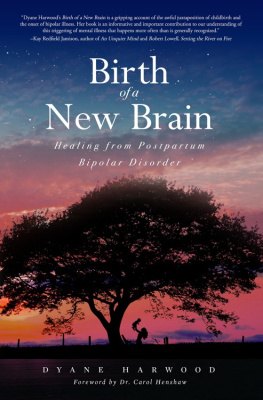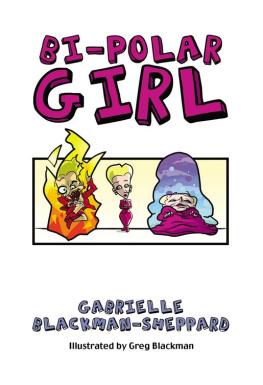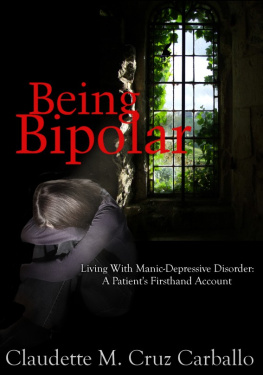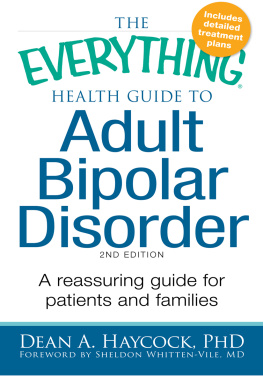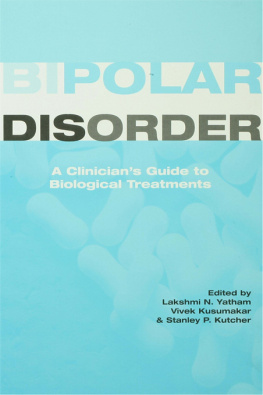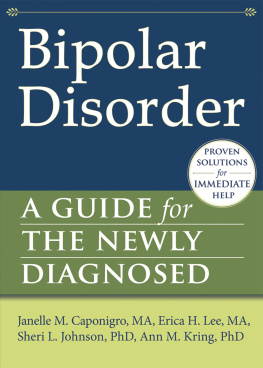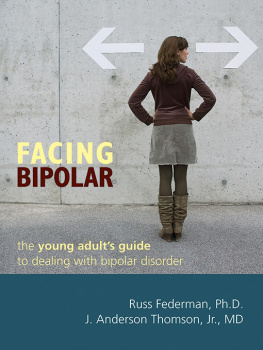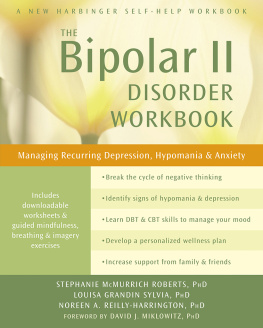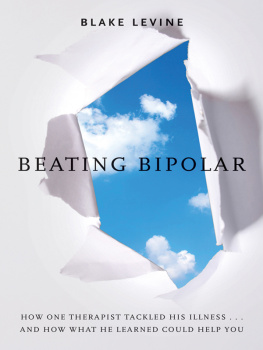Birth
of a
New Brain
Healing from Postpartum
Bipolar Disorder
DYANE HARWOOD
Foreword By Dr. Carol Henshaw

CHAPTER THREE
My Hospital Tour of Duty
W hen Craig and I agreed that Id admit myself to the psychiatric unit, I never wouldve guessed it would be the first of seven hospitalizations.
We used to live in a cabin two blocks from the Santa Cruz Behavioral Health Unit. I had driven by the unimposing, wooden one-story building countless times. The unit was located across the street from the century-old Oakwood Cemetery. I had been afraid of graveyards until we lived next to Oakwood, but I felt comfortable strolling the beautiful, peaceful grounds after work. When I spotted the Behavioral Health Unit on my rambles, I didnt think Id ever come to know it from the inside.
When Craig and the girls accompanied me to the Behavioral Health Unit , we were asked to wait in the reception room until the charge nurse could begin the admission process. A few minutes later, a thin, curly-haired man walked into the room holding a clipboard. He looked familiar, but it took me a minute to figure out how I knew him. In a strange twist of fate, the charge nurse was Nick, a friend of ours . Craig and I had gone to college with Nick, but we had lost touch over the years, and we had no idea he worked in mental health. It was comforting to recognize a familiar face, and Nick assured Craig he d keep an eye on me while I was at the unit. When I said goodbye to my family, I hugged Craig tightly. I gave our girls butterfly kisses, touching my nose to each sweet face while I blinked my eyelashes against their cheeks. I felt a burst of intense sadness at our impending separation.
Nick asked the receptionist to unlock the doors that would lead us into the womens unit. H e promised me he would visit me later, and I was introduced to a short blonde nurse named Sheila. She smiled at me but remained quiet as we walked through the community room . I was surprised there were only a few white-gowned patients milling around.
Where is everyone? I asked.
The patients are in Group Therapy. After that, theyll meet for Self-Care . At noon we break for lunch, Sheila said as we approached a hallway.
Halfway down the corridor, we turned left into a tiny room and faced a windowless space that contained two empty beds. On top of each mustard yellow blanket was a blue folder filled with mental health information and unit procedures. As I set my belongings down, Sheila handed me a toiletries packet, a white gown, and a rough bath towel.
Youll be meeting with the chief psychiatrist, Dr. King, for your mental health assessment later this morning. You can start group therapy tomorrow. Why dont you get settled, and one of us will get you when the doctor is ready.
Thanks, Sheila! I said. After she left, I sat on the bed and stared at the bare, beige walls of the simple room, deflated.
My energy returned when I met with Dr. King. I wasnt embarrassed about my greasy hair, colorless sweatpants and old, grubby t-shirt. Even when I was clean and dressed nicely, doctors intimidated me, but my mania had annihilated my self-consciousness. My appearance no longer mattered. Confidence surged through me I thought I could take on the world!
We sat down in a sunny alcove in the near-empty community room. The sunshine that poured through two skylights was a contrast to the units somber mood . Dr. King could have brought me into a private office, but he made our tte--tte casual. Id come to learn that Dr. King was one of the better psychiatrists who Id encounter over the years. He was compassionate, forthright, and knowledgeable. After we had settled ourselves, I turned to face him directly. He spoke in a low, respectful voice. Earlier Dr. King had spoken at length with Craig about my postpartum behavior and my fathers bipolar one diagnosis. I was upfront with him about my racing thoughts, insomnia, and hypergraphia, and he heard my pressurized speech.
Dyane, your symptoms and family history indicate that you have bipolar one disorder. Youre in the postpartum stage with your child, and it appears that childbirth was the activating factor. Its a very treatable illness, and if you pursue the proper treatment, then you can l ive well with it. But finding effective medications takes time, and it can be a matter of trial and error. We can help you start that process here. Do you have any questions? he asked.
Because I was manic, Dr. King s serious news didnt alarm me. I even found myself smiling. As soon as my five-minute-long, life-changing conversation with Dr. King was over, I made a beeline for the community rooms single pay phone. I wanted to tell my father about my diagnosis right away . Since he had bipolar disorder, I knew hed understand much of what I was experiencing. We had been very close since I was a child when he called me his Little Dyane, and I wanted to hear his loving voice.
I picked up the receiver and dialed zero to make a collect call. Dad had returned to Los Angeles after my brothers wedding, and in a stroke of luck, he was home to answer the phone. My mania acted as a buffer that prevented me from feeling upset. Now that I was officially diagnosed, my life made sense in an ineffable way. I felt joyful when I picked up the phone to call my father. I was, in fact, experiencing the grandiose thoughts of mania.
Not surprisingly, my father didn t share my elation about my big news. He believed he had genetically passed his bipolar disorder to me, and he felt responsible. I had never seen or heard my father cry until that day. After I told him about my talk with Dr. King, he briefly wept until he was able to speak.
Its all my fault you have this, my Little Dyane. Im so sorry, he said. Mania kept me from feeling remorseful about his reaction.
Dad, everything makes sense now, I said. Dont worry, Im doing fine! I glanced behind me to see a young blonde woman waiting to use the phone.
Um Dad, someone needs to use the phone. Ill call you later, I said.
Sure, dont forget! I love you! he said.
Of course Ill call back, Dad. I love you too! I said.
Despite the upbeat sound of my voice and my reassurances, I didnt convince my father I was fine. He knew that my diagnosis was as serious as cancer, diabetes, or any other chronic illness. He didnt want me suffering from the mood disorder.
That initial hospitalization was the only one in which I felt comfortable enough to request visitors. My mania enabled me to be social. I yearned to see familiar faces, especially Marilla, Avonlea, and Craig. My family visited me several times during the four days I was hospitalized.
My mania hadnt made me invulnerable to all tribulations. I was in shock to be separated from my newborn and toddler, and I was homesick. The unit had a jail-like atmosphere that made me feel claustrophobic . Patients werent allowed outdoors, and there were few windows. I attended Self-Care (during which women applied nail polish from old bottles), Group Therapy (where no one wanted to talk) , and Art (where patients colored pictures of simple designs), and I was bored the whole time. During meals, we were given processed food that was beyond recognition and smelled worse than my junior high cafeterias Mystery Meat.
Suffice it to say, the unit was not on the scale of a high-end facility such as Harvards prestigious McLean Hospital or Connecticut s Silver Hill Hospital that offered its celebrity clients amenities galore. As each dull day passed, I grew more desperate to leave so I could be a mother again in my home.
My parents offered to visit me, but I didn t want them around while I was in the hospital. I didnt want to hear their bickering and feel their tension when I was in such a sensitive state. There would be opportunities for them to visit after my discharge. My brother was on his honeymoon, and I preferred to let him enjoy it.
Next page
